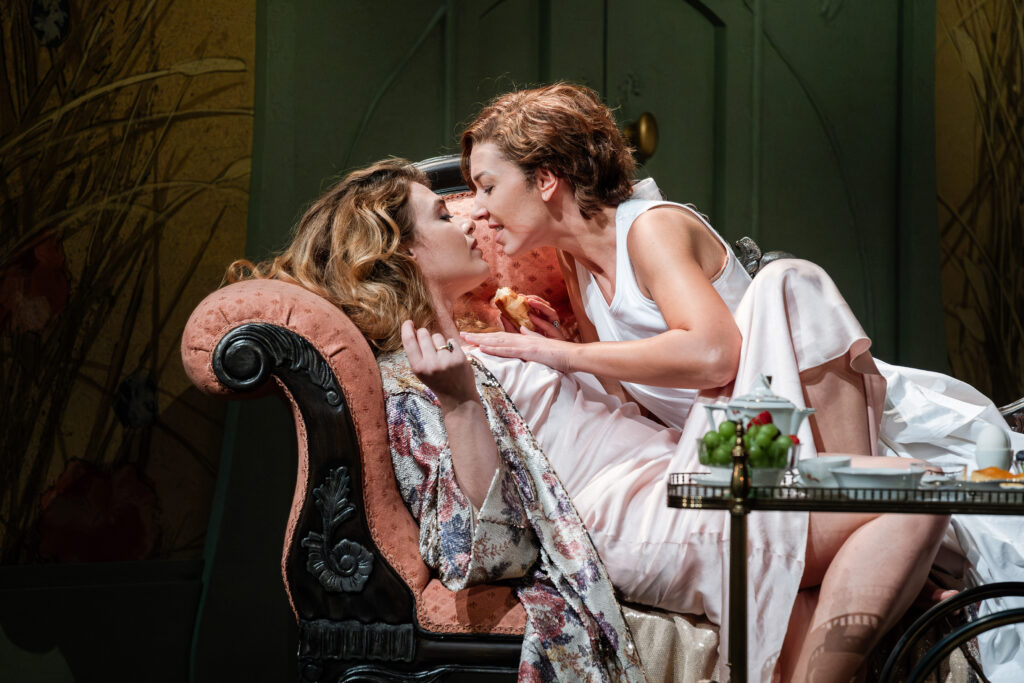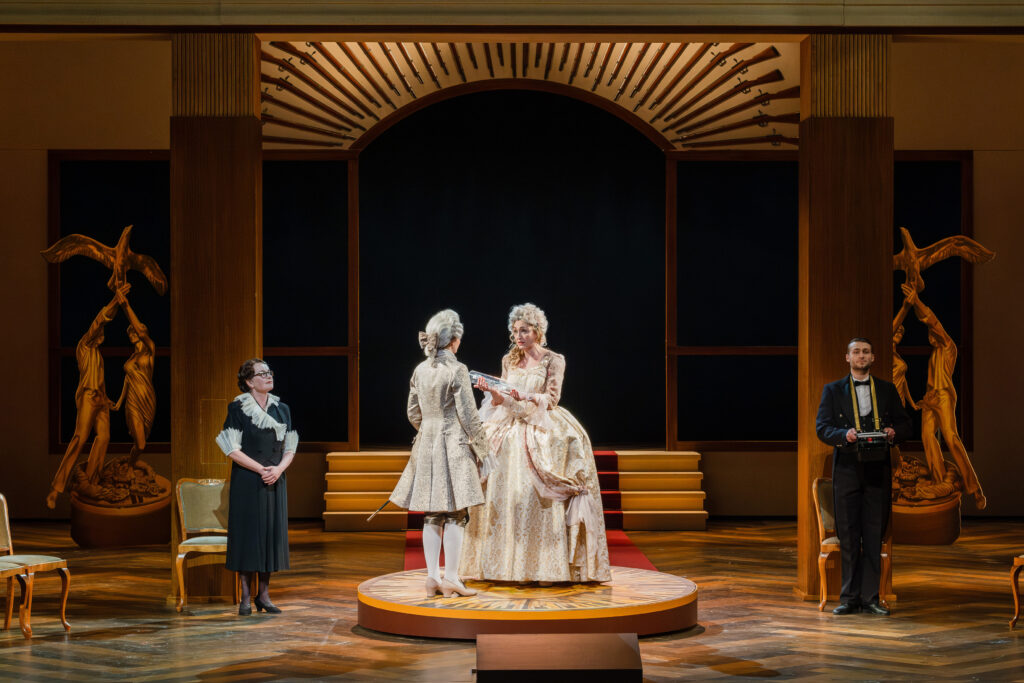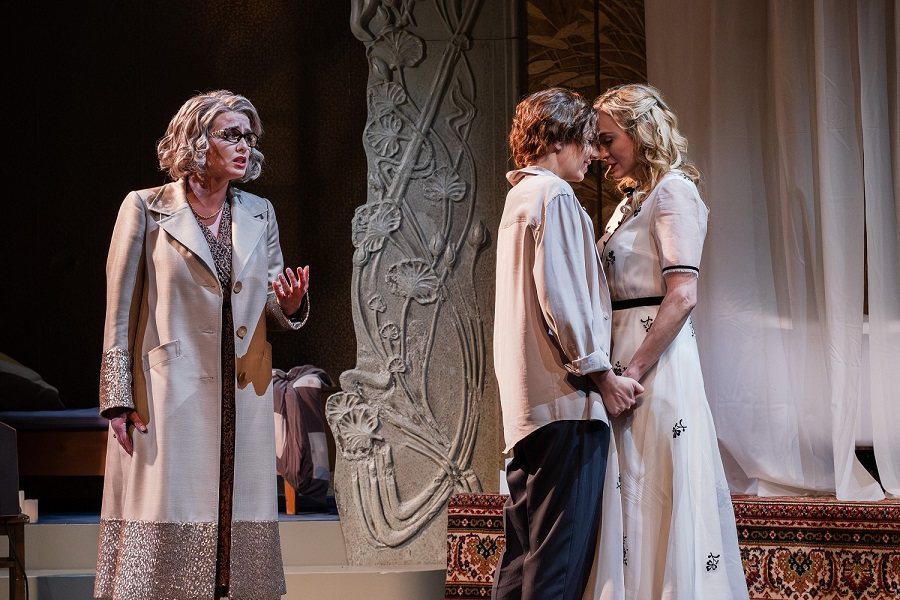The Leipzig Opera presents a new “Rosenkavalier” against the backdrop of the changing times. Michael Schulz‘s production takes a convincing look at double standards.
The Marschallin has recognised the signs of the times and retires. She leaves the field to the younger generation with knowing (age) wisdom. It is deeply sad and tear-jerking, composed by Richard Strauss in a blissfully sweet flood of melodies that could not be more profound and truthful. The down-to-earth Bajuware set the characters from Hugo von Hofmannsthal’s pen to music in a mischievous, ironic and tongue-in-cheek manner. Airy and snappy, but above all: abysmal. After all, the German Strauss is not the Austrian king of waltzes. The waltzes in “Der Rosenkavalier” are the most demanding of his guild, with a wide variety of modulations and reverberations. And therefore also modern as a timeless mirror of social criticism and ambiguity.
In the new production for the Oper Leipzig, Michael Schulz has taken on precisely this double standard in a setting (stage Dirk Becker) that is deliberately not set “in the time of Maria Theresa’s first years of reign, around 1740”, but is conjugated through various epochs. The creators of “Der Rosenkavalier” were already aware of the fact that the setting did not have to correspond to a detailed time frame. And so the production team set the Feldmarschallin‘s bedroom in the first act in Art Nouveau style: The “Antichambrier-Kammern” are placed as small antechambers to the left and right of the stage, and the bed in which the mature marshal amuses herself with the 17-year-old boy Octavian is enthroned in front of the walls painted in the style of Alfons Mucha with cornfields and sunbeams.

The love nest in Mucha’s cornfield is an ambiguous allusion to Baron von Lerchenau’s infatuation with the “young maids from Bohemia”: “I often keep two or three of them in my house until November. Only then do I send them home! They come to the harvest and are otherwise decent and good – only then do I send them home.” The Marschallin also indulges her lust for young men in her own way. And so the starting point is set for the musical comedy as a socio-critical confrontation between power, abuse and sexual fantasies of omnipotence.
To summarise in advance: this interpretation works, and completely. Certainly, some viewers with different viewing habits may have disliked the drastic and explicit nature of the director’s concept. On closer inspection, however, it lies in the work itself and is thus to be seen entirely in the sense of a performance true to the work. For what is the ‘Rosenkavalier’ other than a play about the conflict between generations, about ageing with the central ‘Zeit’-aria of the Marschallin and the victory of youth?
The Marschallin realises at the end of the first act that her relationship with her underage cousin cannot and must not last. In this way, she clearly distinguishes herself from the Baron as the play progresses. Solen Mainguené begins the role with youthful freshness and variable vigour full of blind infatuation, which visibly changes during the signing of the marriage contract. ‘Die Zeit, die ist ein sonderbar’ Ding’ (‘Time, it’s a strange thing’) comes across to the young Frenchwoman from Orange as wistful and profoundly soulful. Her performance has an enormously haunting stage presence.
Baron Ochs auf Lerchenau’s situation is quite different: he wants to remarry and at the same time is constantly chasing after young women. The new marriage, with a detailed contract, is a rite performed in strict bonds and rules, which finds its comprehensible counterpart in the stage design of the second act. With its brown panelling and the imperial eagle on the ceiling, Faninal’s house is set in the staid fraternity Germany of the late 19th century.

The Baron, with his livery servants dressed in Bavarian lederhosen (costumes by Renée Listerdal), is thus set in a coarse and hearty manner that fits in perfectly with this era. Tobias Schabel knows how to portray the role with authentic enthusiasm, but is not entirely convincing in terms of musical presence and expressiveness.
The course of events is familiar: Rosenkavalier Octavian as the bearer of the rose to Sophie, which is to be presented to the Baron as a trophy in her father’s brown fraternity house, does not play along. And unlike the Marschallin, patriarch Ochs is not prepared to give up his lust for young women. And so the stage design of the third act is all the more convincing when the ‘tête à tête’ with Octavian, dressed as a girl with a large plush teddy bear, takes place in the Marschallin’s bedroom, which has now been converted into a brothel and transposed into the disco era of the 1980s with colourful lights and a mirror ball on the ceiling.
Štĕpánka Pučálková is a marvellously haunting Octavian, both playing and singing. Her interpretation makes you sit up and take notice, as she is able to exude a fullness and range in her intensity and expressiveness with simultaneously sensitive and variable intonation, which knows how to convey an appropriate mood in every nuance and in every passage. Even the inherent silvery quality of the role could be heard in the timbre. The Baron has aged and appears old and frail on his date with the supposed maid: He is also costumed by the director as “Grandpa Hoppenstedt”. This is the character who was portrayed in Loriot’s sketches for senility and the past.
Olga Jelínková‘s Sophie was also able to play both the young lover and, above all, the ‘nay-saying’ daughter with clear intonation. With the crystalline timbre of her bright soprano, she completed the trio of three strong women, who performed a wonderfully harmonising, impressive trio at the end. In addition to the final duet ‘Ist ein Traum, kann nicht wirklich sein’, the three singers provided the musical highlight of the evening.

In the other roles, Mathias Hausmann was convincing as Faninal with a solid baritone, Caroline Stein as the Lead Butcher with clear intonation and Piotr Buszewski, who performed his Italian aria as a singer in a minstrel’s costume. Álvaro Zambrano‘s Valzacchi remained somewhat pale.
GMD Christoph Gedschold led the Gewandhausorchester Leipzig through the score at a steady, variable tempo, although some passages on this evening were at times somewhat rushed and indifferent. All in all, however, the interpretation was stringent and did not justify the occasional boos.
The Marschallin has recognised the signs of the times – by expelling the Baron and withdrawing for the new, young love between Sophie and Octavian. And that in contrast to the Baron. To put it bluntly: The makers of ‘Der Rosenkavalier’ do not reveal their own old man fantasies in the play. And in the same sense that Loriot, as the creator of ‘Opa Hoppenstedt’, can never be seen as a propagator of traditional female clichés. On the contrary, he is the crystal-clear critic who, by including this reactionary character in his sketches, shows and criticises the traditional role models of women. And in the new Leipzig ‘Rosenkavalier’, too, such an interpretation does more good than harm, as it demonstrates the progressive nature of the work with its social criticism.
Further performances on 4, 12 May and 14 June 2024.